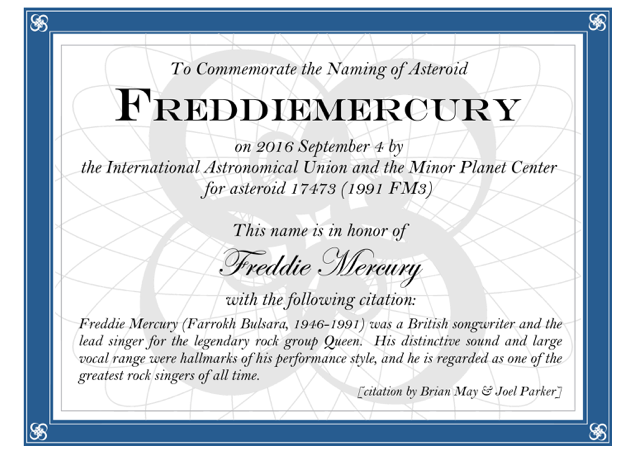Talking via a filmed message, Queen’s Brian May late last night, Sunday, September 4th, announced ‘Asteroid 17473 Freddiemercury’ designated in Freddie’s honour at Freddie For A Day 70th birthday party held at Montreux Casino in aid of Mercury Phoenix Trust.
Over 1,250 fans had gathered to celebrate.
I’m happy to be able to announce that the International Astronomical Union's Minor Planet Center has today designated Asteroid 17473, discovered 1991, in Freddie’s name, timed to honour his 70th Birthday. Henceforth this object will be known as Asteroid 17473 Freddiemercury. Published in the September 4th announcements of the Minor Planet Center, operating out of the Smithsonian Astrophysical Observatory), this announcement is to recognise Freddie’s outstanding influence in the world.
I’m grateful to my dear friend Joel Parker of the Southwest Research Institute (active in the recent groundbreaking NASA Pluto mission and ESA’s Rosetta mission), for working on this idea, and making this happen.
Where is Freddie’s Asteroid ? It’s in the main Asteroid Belt, out between the orbits of Mars and Jupiter, and is about 3 and a half km across. It has an albedo of about 0.3 – which means it only reflects about 30 per cent of the light that falls on it; like many asteroids, it’s a dark object – rather like a cinder in space. Viewed from the Earth it is more than 10,000 times fainter than you can see by eye, so you need a fair-sized telescope to see it … and that’s why it wasn’t discovered until 1991.
We have a nice certificate of ‘adoption’ issued by the International Astronomical Union and the Minor Planet Center, which says:
This name is in honour of Freddie Mercury, with the following citation:
Freddie Mercury (Farrokh Bulsara, 1946-1991) was a British songwriter, and the lead singer for the legendary rock group Queen. His distinctive sound and large vocal range were hallmarks of his performance style, and he is regarded as one of the greatest rock singers of all time.
Thanks to Marc Buie who provided the contact to the observer, and Brian Skiff from Lowell Observatory.
Special thanks to Gareth Williams at the International Astronomical Union's Minor Planet Center.
And so - for its first appearance in public … Asteroid Freddiemercury !
Happy Birthday Freddie !
Bri
In issuing the Certificate of Designation, Joel Parker of the Southwest Research Institute said:
“Singer Freddie Mercury sang, ‘I'm a shooting star leaping through the sky’ - and now that is even more true than ever before. Today in celebration of his 70th birthday, an asteroid has been named Freddiemercury in honor of the charismatic singer for the band Queen.
Asteroid names are governed by the International Astronomical Union (IAU) and published by the Minor Planet Center. When an asteroid is initially discovered it is given a ‘provisional designation’ until enough measurements have been made that its orbit is accurately determined. At that point, it is given a number and is eligible to get a name as well. In this case, the asteroid in question was discovered in 1991 and was given the provisional designation ‘1991 FM3’. It has been observed and its position and orbit measured over 1,100 times, and it was given the number 17473.
When a proposal to name an asteroid after Freddie Mercury was received by the Minor Planet Center, the IAU group selected this asteroid partly due to the ‘FM’ in the designation.
The name approved by the IAU is the formal and official name forever to be associated with this asteroid; so, any scientific papers in the future that study this asteroid will refer to it as ‘17473 Freddiemercury’.
But even if you can't see Freddiemercury leaping through the sky, you can be sure he's there – ‘floating around in ecstasy’, as he might sing - for millennia to come.”

